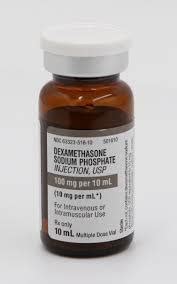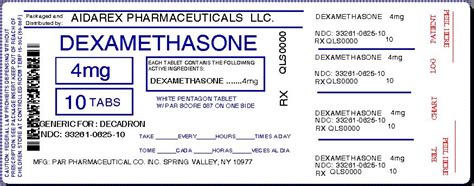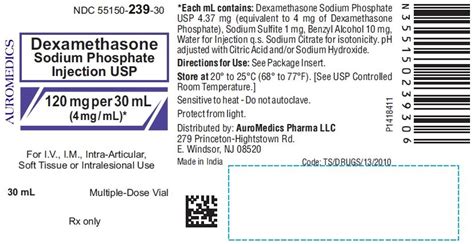Intro
Dexamethasone treats inflammation, allergic reactions, and immune disorders, offering relief from symptoms like swelling, redness, and itching, as a corticosteroid medication.
Dexamethasone is a synthetic corticosteroid that has been widely used in the medical field for its potent anti-inflammatory and immunosuppressive properties. The importance of understanding the uses, benefits, and potential side effects of dexamethasone cannot be overstated, as it is a medication that can have a significant impact on the health and well-being of individuals. In this article, we will delve into the various uses of dexamethasone, its working mechanisms, and the key information that individuals need to know when taking this medication.
The use of dexamethasone is diverse, ranging from the treatment of inflammatory conditions such as rheumatoid arthritis and bronchial asthma to the management of autoimmune diseases like lupus and multiple sclerosis. Its ability to suppress the immune system also makes it an effective medication for preventing organ rejection in transplant patients. Furthermore, dexamethasone has been used in the treatment of certain types of cancer, such as leukemia and lymphoma, due to its ability to induce apoptosis in cancer cells.
The benefits of dexamethasone are numerous, and its use has been associated with significant improvements in the quality of life of individuals suffering from chronic inflammatory and autoimmune diseases. By reducing inflammation and suppressing the immune system, dexamethasone can help to alleviate symptoms such as pain, swelling, and fatigue, allowing individuals to lead more active and productive lives. Additionally, its use has been shown to improve outcomes in patients with certain types of cancer, highlighting its importance in the field of oncology.
Dexamethasone Uses

Dexamethasone for Inflammatory Conditions
Dexamethasone is often used to treat inflammatory conditions such as rheumatoid arthritis, bronchial asthma, and inflammatory bowel disease. Its anti-inflammatory properties make it an effective medication for reducing swelling, pain, and stiffness in the joints, as well as alleviating symptoms such as shortness of breath and wheezing in asthma patients. Additionally, dexamethasone has been shown to improve outcomes in patients with inflammatory bowel disease, including those with Crohn's disease and ulcerative colitis.Dexamethasone for Autoimmune Diseases

Dexamethasone for Cancer Treatment
Dexamethasone has been used in the treatment of certain types of cancer, including leukemia and lymphoma. Its ability to induce apoptosis in cancer cells makes it an effective medication for reducing tumor size and improving outcomes in patients with these conditions. Additionally, dexamethasone has been used to manage symptoms such as pain, nausea, and fatigue in cancer patients, highlighting its importance in the field of oncology.Dexamethasone Side Effects

Dexamethasone Dosage and Administration
The dosage and administration of dexamethasone can vary depending on the condition being treated and the individual patient's needs. In general, dexamethasone is administered orally or intravenously, with the dosage ranging from 0.5 to 9 mg per day. It is essential to follow the dosage instructions carefully and attend regular follow-up appointments with a healthcare provider to monitor for potential side effects and adjust the dosage as needed.Dexamethasone Interactions

Dexamethasone and Pregnancy
Dexamethasone can be used during pregnancy, but it is essential to carefully weigh the benefits and risks. Dexamethasone has been shown to cross the placenta and may affect fetal development, highlighting the importance of careful monitoring and management during pregnancy. Additionally, dexamethasone can increase the risk of premature birth and low birth weight, emphasizing the need for close surveillance and regular follow-up appointments with a healthcare provider.Dexamethasone and Breastfeeding

Dexamethasone and Geriatric Use
Dexamethasone can be used in older adults, but it is essential to carefully monitor for potential side effects. Older adults may be more susceptible to the side effects of dexamethasone, including osteoporosis, cataracts, and glaucoma. Additionally, dexamethasone can interact with a range of medications commonly used in older adults, including blood thinners and diabetes medications, highlighting the importance of careful monitoring and management.Dexamethasone Warnings and Precautions

Dexamethasone Overdose
Dexamethasone overdose can occur, and it is essential to seek medical attention immediately if symptoms such as dizziness, nausea, and vomiting occur. Dexamethasone overdose can cause a range of complications, including adrenal insufficiency, osteoporosis, and increased risk of infection, highlighting the importance of careful monitoring and management.Dexamethasone Storage and Disposal

Dexamethasone Patient Education
Patient education is essential when taking dexamethasone, highlighting the importance of careful monitoring and management. It is essential to inform a healthcare provider about all medications being taken, including over-the-counter medications and supplements, to minimize the risk of interactions and ensure safe and effective treatment. Additionally, patients should be aware of the potential side effects of dexamethasone and seek medical attention immediately if symptoms such as dizziness, nausea, and vomiting occur.In conclusion, dexamethasone is a synthetic corticosteroid that has been widely used in the medical field for its potent anti-inflammatory and immunosuppressive properties. Its use has been associated with significant improvements in the quality of life of individuals suffering from chronic inflammatory and autoimmune diseases, as well as certain types of cancer. However, dexamethasone can also cause a range of side effects, highlighting the importance of careful monitoring and management. By understanding the uses, benefits, and potential side effects of dexamethasone, individuals can make informed decisions about their treatment and work closely with their healthcare provider to minimize the risk of complications.
What is dexamethasone used for?
+Dexamethasone is used to treat a range of conditions, including inflammatory conditions, autoimmune diseases, and certain types of cancer.
What are the side effects of dexamethasone?
+The side effects of dexamethasone can include weight gain, mood changes, and insomnia, as well as increased risk of infection and osteoporosis.
How is dexamethasone administered?
+Dexamethasone can be administered orally or intravenously, with the dosage ranging from 0.5 to 9 mg per day.
Can dexamethasone be used during pregnancy?
+Dexamethasone can be used during pregnancy, but it is essential to carefully weigh the benefits and risks and attend regular follow-up appointments with a healthcare provider.
Can dexamethasone be used during breastfeeding?
+Dexamethasone can be used during breastfeeding, but it is essential to carefully monitor the infant for potential side effects and attend regular follow-up appointments with a healthcare provider.
